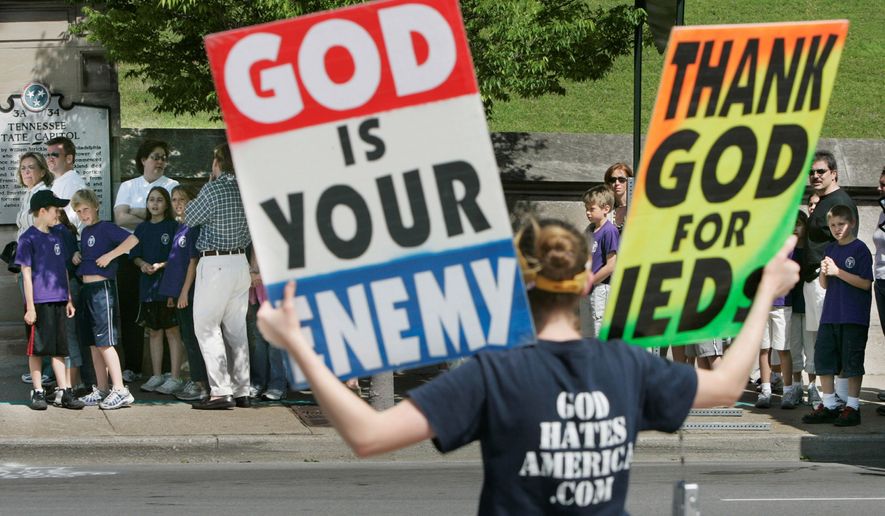The Supreme Court ruled decisively Wednesday that a fringe anti-gay group has a constitutionally protected right to stage hateful protests at the funerals of dead servicemen, saying “such speech cannot be restricted simply because it is upsetting or arouses contempt.”
In one of the year’s most closely watched cases, the Supreme Court in an 8-1 decision upheld a lower-court ruling to throw out a multimillion-dollar judgment that the father of a dead U.S. Marine from Maryland had won against the Westboro Baptist Church.
Chief Justice John G. Roberts Jr., in writing the majority opinion, noted that “speech is powerful” and can “inflict great pain.”
“On the facts before us, we cannot react to that pain by punishing the speaker,” the chief justice wrote. “As a nation, we have chosen a different course — to protect even hurtful speech on public issues to ensure that we do not stifle public debate.”
Justice Samuel A. Alito Jr. rebuked the majority and wrote in a blistering dissent that “our profound national commitment to free and open debate is not a license for the vicious verbal assault that occurred in this case.”
Justice Alito wrote that Westboro Baptist’s attacks “make no contribution to public debate” and “allowing family members to have a few hours of peace without harassment does not undermine public debate.”
Westboro Baptist’s “outrageous conduct caused the petitioner great injury, and the court now compounds that injury by depriving the petitioner of a judgment that acknowledges the wrong he suffered,” Justice Alito wrote.
“In order to have a society in which public issues can be openly and vigorously debated, it is not necessary to allow the brutalization of innocent victims like the petitioner.”
Bonnie Carroll, founder and chairwoman of the Tragedy Assistance Program for Survivors, or TAPS, which provides support to those who lose family members who served in the military, said the ruling “upheld the rights of a radical fringe group to continue to harass the surviving families of our fallen military when they hold funerals for their loved ones.”
“Few Americans understand or are asked to endure what surviving families of our fallen military go through when planning a funeral,” Ms. Carroll said. “Today’s Supreme Court ruling means that the surviving families of our fallen military will continue to be harassed by this radical fringe organization.”
Margie J. Phelps, a leader of Westboro Baptist Church in Topeka, Kan., told reporters there the congregation intended to “quadruple” the number of its funeral protests as a result of the Supreme Court ruling.
“We are trying to warn you to flee the wrath of God, flee the wrath of destruction. What would be more kind than that?” said Ms. Phelps, daughter of the church’s leader, the Rev. Fred W. Phelps, and legal counsel for the group. “We have not slowed down, and we will not.”
Members of Westboro Baptist Church protested at the 2006 funeral Mass of Marine Lance Cpl. Matthew Snyder and carried signs with anti-gay, anti-military and anti-Catholic messages, such as “Thank God for Dead Soldiers” and “Priests Rape Boys.”
The Topeka church, which has fewer than 100 members, most of whom are related to Mr. Phelps, has staged about 600 similar protests at military funerals. The group believes misfortune and tragedies suffered by Americans are God’s punishment for a nation that is too tolerant of homosexuality.
Albert Snyder sued after his son’s funeral, accusing the group of intentional infliction of emotional distress. Mr. Snyder said the protests caused severe depression, exacerbated other health problems and left him unable to separate thoughts of his dead son from Westboro Baptist’s picketing.
A federal trial court in Maryland awarded Mr. Snyder an $11 million judgment, an amount later reduced to $5 million. But the church appealed, and the 4th U.S. Circuit Court of Appeals in Richmond, Va., threw out the judgment, ruling the protest was protected under the First Amendment.
The Supreme Court, which heard arguments in the case in October, backed the appellate court’s decision.
The high court said Westboro Baptist’s protest is protected under the First Amendment because it focused on matters of public concern, namely the “political and moral conduct of the United States,” gays in the military and the sexual-abuse scandal surrounding the Catholic Church.
Chief Justice Roberts noted the “messages may fall short of refined social or political commentary,” but he said the church members have engaged in many such protests, and nothing suggests they used “speech on public matters” to “mask an attack on Snyder over a private matter.”
“And even if a few of the signs — such as “You’re Going to Hell” and “God Hates You” — were viewed as containing messages related to Matthew Snyder or the Snyders specifically, that would not change the fact that the overall thrust and dominant theme of Westboro’s demonstration spoke to broader public issues,” the chief justice wrote.
Chief Justice Roberts also wrote that the protesters followed the directions of law enforcement officials, gathering 1,000 feet from the church and out of the sight of funeral goers. The protest included no shouting, profanity or violence.
Mr. Snyder testified during trial that he could only see the tops of the protesters’ signs when the funeral procession passed within about 200 to 300 feet of the picketers. He said he later learned the content of the signs from news reports.
The chief justice acknowledged that the legal term “emotional distress” fails to fully capture “the anguish Westboro Baptist’s choice added to Mr. Snyder’s already incalculable grief.” But, he added, a peaceful protest in a public space on public issues occupies a “special position in terms of First Amendment protection.”
“Westboro’s funeral picketing is certainly hurtful, and its contribution to public discourse may be negligible,” Chief Justice Roberts wrote. “But Westboro addressed matters of public import on public property, in a peaceful manner, in full compliance with the guidance of local officials.”
• Ben Conery can be reached at bconery@washingtontimes.com.




Please read our comment policy before commenting.